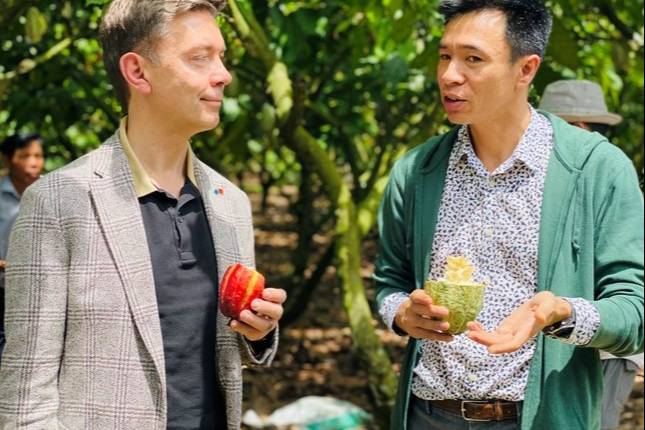During his visit to Viet Nam from March 12-14, EU Ambassador Julien Guerrier toured the country's largest cacao-growing region in the Central Highlands. The trip focused on circular economy models that help Vietnamese agricultural products meet the strict standards of markets such as the EU, Japan, and the U.S.
As part of his visit, Ambassador Guerrier witnessed firsthand the implementation of circular farming models under an EU-supported project. One highlight was his visit to Nhat Thong Organic Farm, which integrates cacao cultivation with other crops across 300 hectares using sustainable farming methods.
Located in Cu Bao Commune, Buon Ho Town, Dak Lak Province, the farm receives EU support in cacao cultivation techniques, seedling nurseries, livestock feed formulas, and organic waste recycling systems. The farm also utilizes black soldier fly larvae and earthworms to create a self-sustaining circular agricultural system, producing internationally certified organic products.
Following his visit, Ambassador Guerrier expressed his admiration for the progress made by Vietnamese farmers in developing high-quality, sustainable agricultural value chains with EU support. He emphasized that these efforts enable them to sell premium organic cacao to top chocolate manufacturers worldwide.
 Ambassador Julien Guerrier learns about cocoa farming practices in the Central Highlands (Photo: Thu Loan)
Ambassador Julien Guerrier learns about cocoa farming practices in the Central Highlands (Photo: Thu Loan)The Ambassador also noted that Vietnamese farms and businesses adapt well to the EU's anti-deforestation regulations. With sustainability certifications from the EU, Japan, and other developed markets, Vietnamese agricultural products are well-positioned to secure higher export value in premium market segments.
Ambassador Guerrier highlighted that since the EU announced its anti-deforestation regulations, Viet Nam has been at the forefront of compliance efforts to meet the deadline by the end of last year. However, the EU postponed implementation as many other countries were not yet ready.
Since 2007, the EU's SWITCH-Asia Program has promoted sustainable production and consumption models across Asia. In Viet Nam , the cacao industry was selected as a pioneering model. Through this initiative, the Swiss development organization Helvetas, in collaboration with the Community Development Center (CDC) and other partners, has been implementing a project in Dak Lak and Dak Nong provinces to support sustainable cacao production.